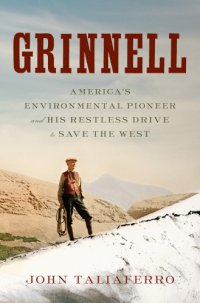
Ebook: Grinnell: America's environmental pioneer and his restless drive to save the West
Author: Grinnell George Bird, Taliaferro John
- Tags: Conservationists, Conservationists--United States, HISTORY--United States--State & Local--West (AK CA CO HI ID MT NV UT WY), Natural history, Natural history--West (U.S.), Naturalists, Naturalists--United States, Nature conservation, Nature conservation--United States--History, NATURE--Environmental Conservation & Protection, SCIENCE--Life Sciences--Biology--General, History, Biographies, Biography, Grinnell George Bird -- 1849-1938, Natural history -- West (U.S.), West (U.S.) -- History -- 1860-1890
- Year: 2019
- Publisher: Liveright Publishing Corporation
- City: United States;West (U.S.);West United States
- Edition: First edition
- Language: English
- epub
Introduction: Evolution and extinction -- Audubon Park -- Member of the class -- The Yale Expedition -- A wild gallop -- The Black Hills -- A nation's park -- Age of surprises -- Thorough sportsman -- No tenderfoot he -- Dear partner -- The Audubon Society -- The rock climbers -- Fair chase -- Ghost Dance -- Sacred range -- Standing menace -- The ceded strip -- A plank -- Diverse voices -- Eclipse of memory -- The Alaska expedition -- Indians of to-day -- Winning of the West -- The captured woman -- Temporary sojourners -- Pulverizing engine -- Stuyvesant Square -- Break the old habit -- Undue destruction -- Fighting Cheyennes -- The National Park Service -- All this better work -- A complex life -- Melting rapidly -- A strong strand -- Epilogue: Do more good.;"George Bird Grinnell, the son of a New York merchant, saw a different future for a nation in the thrall of the Industrial Age. With railroads scarring virgin lands and the formerly vast buffalo herds decimated, the country faced a crossroads: Could it pursue Manifest Destiny without destroying its natural bounty and beauty? The alarm that Grinnell sounded would spark America's conservation movement. Yet today his name has been forgotten -- an omission that John Taliaferro's commanding biography sets right with narrative flair. Grinnell was born in Brooklyn in 1849 and grew up on the estate of ornithologist John James Audubon. Upon graduation from Yale, he dug for dinosaurs on the Great Plains with eminent paleontologist Othniel C. Marsh -- an expedition that fanned his romantic notion of wilderness and taught him a graphic lesson in evolution and extinction. Soon he joined George A. Custer in the Black Hills, helped to map Yellowstone, and scaled the peaks and glaciers that, through his labors, would become Glacier National Park. Along the way, he became one of America's most respected ethnologists; seasons spent among the Plains Indians produced numerous articles and books, including his tour de force, The Cheyenne Indians: Their History and Ways of Life. And as a renowned editor, Grinnell turned the sportsmen's journal Forest and Stream into a bully pulpit for wildlife protection, forest reserves, and national parks. In 1886, Grinnell's distress over the loss of bird species prompted him to found the first Audubon Society. Next, he and Theodore Roosevelt founded the Boone and Crockett Club to promote 'fair chase' of big game. His influence provided leverage for the first federal legislation to protect migratory birds -- a precedent that ultimately paved the way for the Endangered Species Act of 1973. And in an era when too many white Americans regarded Native Americans as backward, Grinnell's cries for reform carried from the reservation, through the halls of Congress, all the way to the White House. Drawing on forty thousand pages of Grinnell's correspondence and dozens of his diaries, Taliaferro reveals a man whose deeds and high-mindedness earned him an esteemed peerage, from presidents to chiefs, Audubon to Aldo Leopold, John Muir to Gifford Pinchot, Edward S. Curtis to Edward H. Harriman. Throughout his long life, Grinnell was bound by family and sustained by intimate friendships, toggling between the East and the West. As Taliaferro's enthralling portrait demonstrates, it was this tension that wound Grinnell's nearly inexhaustible spring and honed his vision -- a vision that still guides the imperiled future of our national treasures."--Jacket.
Download the book Grinnell: America's environmental pioneer and his restless drive to save the West for free or read online
Continue reading on any device:

Last viewed books
Related books
{related-news}
Comments (0)